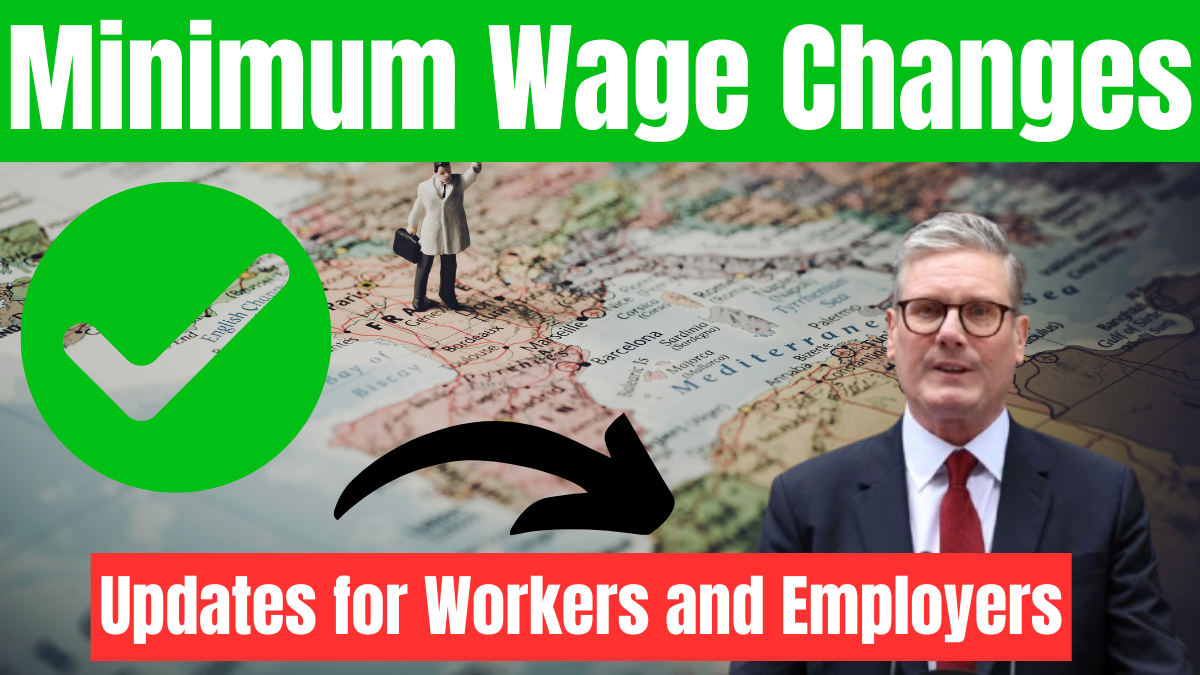The UK government has confirmed new minimum wage rates set to take effect from March 2025, aimed at supporting workers amid rising living costs. These changes will benefit over three million employees across various sectors while challenging employers to adjust payroll budgets.
The minimum wage adjustments cover different age groups and employment categories, ensuring fair pay and improved living standards.

| Category | New Hourly Rate | Previous Rate (April 2024) | Increase (£) | Increase (%) |
|---|---|---|---|---|
| National Living Wage (21+) | £12.21 | £11.44 | £0.77 | 6.7% |
| 18-20 Year Olds | £10.00 | £8.60 | £1.40 | 16.3% |
| 16-17 Year Olds | £7.55 | £6.40 | £1.15 | 18.0% |
| Apprentice Rate | £7.55 | £6.40 | £1.15 | 18.0% |
| Accommodation Offset | £10.66 | £9.99 | £0.67 | 6.7% |
Why Does the March 2025 Minimum Wage Increase Matter?
The minimum wage rise addresses the cost of living crisis, aiming to:
- Improve financial security for millions of workers.
- Enhance employee morale and retention rates.
- Support wage equality across different age groups.
- Promote economic stability amid inflation.
Employers, however, must prepare for the financial implications of these increases on payroll budgets.
How Will Workers Benefit From the New Minimum Wage Rates?
1. Greater Financial Stability
The new rates will help employees manage essential expenses like housing, groceries, and transportation.
Example Calculation:
- Previous weekly earnings (37.5 hours at £11.44): £428.25
- New weekly earnings (37.5 hours at £12.21): £457.88
- Annual increase: Approximately £1,400 for full-time workers.
2. Improved Wage Equality for Young Workers
Youth and apprentice wages have seen significant percentage increases to bridge wage gaps.
Example Impact:
- A 19-year-old working 20 hours per week will now earn £200 weekly, up from £172.
- The rise encourages young workers to pursue roles in industries like retail, hospitality, and construction.
3. Better Housing Support With Accommodation Offset Increase
The accommodation offset increase to £10.66 per day ensures fair wage deductions for employees receiving employer-provided housing.
MUST READ: £2,950 WASPI Payout Confirmed – Full Compensation Details for Eligible Women in March 2025
What Do Employers Need to Consider With the March 2025 Wage Changes?
1. How Should Employers Adjust Payroll Budgets?
Businesses must reassess payroll expenses to manage the increased labor costs. Key steps include:
- Conducting a payroll impact assessment.
- Revising budget forecasts for 2025.
- Identifying cost-saving strategies without compromising quality.
2. What Strategies Can Help Manage Higher Labor Costs?
Employers can implement efficiency measures to balance the higher wages:
- Retailers: Use self-service checkouts to reduce staff workload.
- Restaurants: Adopt digital ordering systems for faster service.
- Manufacturers: Invest in automation to streamline production processes.
3. Why Should Employers Invest in Employee Training?
Upskilling staff can increase productivity, making wage hikes more manageable. Benefits include:
- Higher employee retention rates.
- Improved workplace efficiency.
- Lower recruitment and training costs.
4. How Can Employers Communicate Wage Changes Effectively?
Clear communication fosters transparency and trust. Employers should:
- Hold regular meetings to explain wage adjustments.
- Send digital updates or memos highlighting the impact on earnings.
- Provide one-on-one consultations to address individual concerns.
FAQs
When will the new UK minimum wage rates take effect?
The confirmed minimum wage changes will come into force from March 2025.
Who benefits from the March 2025 minimum wage increase?
Employees aged 16 and above, including apprentices, will benefit from the new wage rates.
How much will full-time workers gain from the wage increase?
Full-time workers earning the National Living Wage will see an annual increase of approximately £1,400.
Why did the government raise the minimum wage in March 2025?
The increase addresses rising living costs and aims to improve wage fairness across different sectors.
How should employers prepare for higher payroll costs?
Employers should reassess budgets, explore automation, and invest in employee training to balance expenses.
What industries will see the most significant wage adjustments?
Retail, hospitality, and construction sectors will notably benefit, especially for younger workers and apprentices.
Is there any support for businesses struggling with wage increases?
Some government programs offer financial advice and grants to help businesses manage the new rates.
Can employees report if they’re not receiving the updated wage?
Yes, workers can report wage discrepancies to HMRC or seek advice from employment unions.
Click here to know more.
Aanchal is a passionate writer with a keen interest in storytelling, content creation, and creative expression. She enjoys exploring diverse topics and crafting engaging narratives that captivate readers.